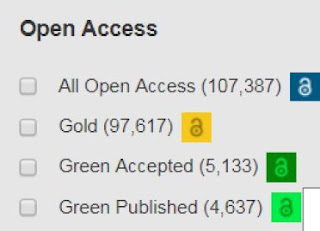Aberystwyth
University is well known for providing one of the best student experiences in
the UK and a large part of that is down to the strong sense of belonging that
we foster, not only with students and staff but with the wider community too.
This year’s
Aber LibTeachMeet focusing on inclusivity was a great opportunity to examine
what it is we are currently doing so well but also to explore what else we can
do both as individuals and as an institution to more actively meet the diverse
needs of our users and to make the library as inclusive as possible to
everyone.
We prepared
ten presentations exploring various elements of inclusivity - accommodating the
needs of international or bilingual students, supporting those with sight impairments
or those who stammer or building inclusivity by encouraging students to read.
The event
itself reflected the topic discussed. Speakers came from four different
institutions – Aberystwyth University, University of Leicester, Sheffield
Hallam University and Swansea University. Also, three different departments from
within Aberystwyth University were represented – the International Student
Centre, Student Support, and Information Services. The atmosphere was informal
and kind, we openly discussed ideas, asked questions and expressed appreciation
for shared experiences.
The day
started with a subject librarian, Lloyd Roderick, who gave a
presentation on his experience of teaching information literacy bilingually. He
shared a few useful resources such as Esboniadur and Gwerddon for helping to
support students studying in the Welsh language.

Lloyd’s talk was followed by
Yvonne Rinkart from the International Student Centre who presented the findings
of a short study exploring international foundation students’ library usage.
One of the points raised by Yvonne was that international students are more
susceptible to ‘library anxiety’ – the feeling of being confused and
overwhelmed that libraries can sometimes induce.
The next presentation given by John
Harrington and Diane Jones, speakers from the Student Support Centre, gave us a
good overview of the disability services they provide along with statistics for
Aberystwyth University, and explained what inclusion really means.
We had the opportunity to look at inclusivity from the student perspective
too. A recent AU graduate, Cerys Davies, talked about her experience of using
library services as a student with sight impairments. The talk inspired a wave
of positive comments and questions. Among many other valuable points, Cerys
talked about the difficulty she faced in obtaining accessible reading
materials.
Our first external speakers of the day were Harinder Matharu and Adam
Smith who had joined us from the University of Leicester. They gave us an
overview of the two initiatives contributing to their inclusive university
environment - Read at Leicester and Unearthing Histories. Deepening the sense
of belonging of minority groups by exploring their history in university’s
archives was a truly inspiring idea.
One of the IT Helpdesk crew members – Alice Farnworth talked about the
benefits of embedding DSA software training within our library service. She
presented us with a variety of assistive tools, of which some such as
Read&Write or Inspiration are available on public computers at Aber.
Next
up, Philippa Price, who has been shortlisted for the Welsh Librarian of the
year Award, told us about the Inclusive Services Group set up at Swansea
University. Philippa talked about a broad range of initiatives the Group is
organizing and promoting, such as creating recommended reading lists for the LGBT
community or putting together dignity packs for homeless women.
Hannah Dee, a lecturer from the Computer Science Department talked us
through the idea of improving students’ writing and the ability to read by
setting up a science-fiction book club for students and staff from her
department. Hannah also introduced us to some interesting books, for which we
are very grateful.

Another visiting speaker, Paul Conway from Sheffield Hallam University, discussed
accessible templates for presentations and hand-outs and other tips on being
inclusive in the classroom. Kate Wright from the Aberystwyth University
E-Learning Group delivered a short presentation on supporting users with a
stammer. Kate raised a few interesting points including stammering not being
perceived as disability, although it is classified as one. She also discussed the
stereotypes surrounding stammering.
As with our
last three LibTeachMeets this was a fantastic forum for not only reflecting on
current practice but for generating the new ideas necessary for us to continue
to build on our reputation for inclusivity in a diverse and fast-changing
environment. We received positive feedback from speakers and attendees who described
the programme as interesting, varied, informative and thought-provoking. We
greatly appreciate all who joined in and we hope it will generate some great
ideas that will assist in our aim of increasing the awareness and accessibility
of both the library facilities and the services on offer here.







